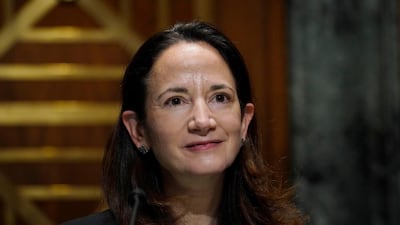President-elect Joe Biden’s nominee to oversee the vast US intelligence apparatus told the Senate on Tuesday that she would take “an aggressive stance” with China, echoing the growing chorus of bipartisan calls in Washington to up the ante between the world’s largest and second-largest military spenders.
Avril Haines, Mr Biden's nominee to serve as director of national intelligence, indicated that the incoming administration would take a more assertive approach to China than the Obama administration during her confirmation hearing.
“Our approach to China has to evolve and essentially meet the reality of the particularly assertive and aggressive China that we see today,” said Ms Haines, who previously served as former president Barack Obama’s deputy national security adviser and deputy director of the CIA.
“China is a challenge to our security, to our prosperity, to our values across a range of issues and I do support an aggressive stance, in a sense, to deal with the challenge that we’re facing,” she said.
“That’s the place where we are now, and one that’s more assertive than where we had been in the Obama-Biden administration,” said Ms Haines. “And if I’m confirmed, I think the intelligence community can do a lot to help in that respect.”
Ms Haines’s comments came in response to a question from Susan Collins, a Republican senator, who asked if she had any concerns regarding the Obama administration’s approach to China. The Senate must vote to confirm Ms Haines and Mr Biden’s other Cabinet nominees before they can take their posts.
The top Democrat on the Senate Intelligence Committee, Mark Warner, also made it clear that he expects the Biden administration to take a more assertive approach to China.
“For a number of decades, we had a bipartisan consensus about China, that the more they came into the world order, the closer they would move to some level of international norms,” said Mr Warner. “I’ll be the first to acknowledge I was part of that consensus, and I think I was wrong.”
However, Ms Haines did indicate that the Biden administration would pursue some continuity with the Obama administration, which sought to collaborate with Beijing when possible.
“China is adversarial and an adversary on some issues, and on other issues we try to co-operate with them, whether in the context of climate change or other things,” Ms Haines told Mr Warner. “Ultimately, the frame the president-elect has identified for thinking about this is as a global competitor,” she said.
“When it comes to espionage or a variety of areas that I’ll of course be focused on if I am confirmed as director of national intelligence, they are an adversary.”
Ms Haines vowed in her opening remarks before the Senate to gain and share “insight into China’s intentions and capabilities while also supporting more immediate efforts to counter Beijing’s unfair, illegal, aggressive and coercive actions, as well as its human rights violations, whenever we can.”
Marco Rubio, the committee's acting chairman, also pressed Ms Haines on whether she had worked on behalf of the Chinese Communist Party or other foreign governments during her work at WestExec Advisors, a consulting firm that became a haven for former Obama administration officials during the Donald Trump era. Ms Haines said she had not.
Senators also questioned Ms Haines on Iran, given Mr Biden's pledge to return to the nuclear deal.
“The president-elect has indicated that if Iran were to come back into compliance, that he would direct that we do so as well,” Ms Haines told Ms Collins, a sceptic of the accord.
“I think, frankly, we’re a long way from that, and I think that there’s going to be an opportunity to consult with Congress and members like yourself on these issues as we look at that.”


